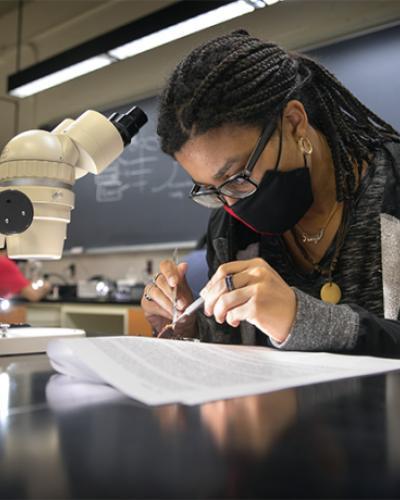Antiracism Statement
As a department, we recognize both the necessity and the challenges in overcoming the systemic racism, based on racist policy, which is so pervasive in our society, our institutions, and our academic fields, and which has a major and clearly negative impact on Black and Indigenous People, and People Of Color (BIPOC). We are committed to building an antiracist agenda in our department with the core aim to root out embedded racism in all our activities, including our recruitment processes, our curricula, our social environment, and the way that our department interacts with the wider community. We understand that change needs to be real rather than aspirational, and there needs to be transparency and accountability in effecting that change. Importantly, actions must involve listening to BIPOC members of our community, and BIPOC individuals from other communities influenced by our actions, and taking decisive community-wide steps towards change. As a department, we appreciate that we have substantial work to do, but the rewards that come from positive change are very high. We are committed to investing the time and effort needed to implement these positive changes.
Land Acknowledgement
Cornell University is located on the traditional homelands of the Gayogo̱hó꞉nǫɁ (the Cayuga Nation). The Gayogo̱hó꞉nǫɁ are members of the Haudenosaunee Confederacy, an alliance of six sovereign Nations with a historic and contemporary presence on this land. The Confederacy precedes the establishment of Cornell University, New York State, and the United States of America. We acknowledge the painful history of Gayogo̱hó꞉nǫɁ dispossession, and honor the ongoing connection of Gayogo̱hó꞉nǫɁ people, past and present, to these lands and waters.
The American Indian and Indigenous Studies Program (AIISP) has submitted this land acknowledgement to traditional Gayogo̱hó꞉nǫɁ leaders for their consideration and approval. We will post a final version as soon as it is available.
Safe Workplace
The Department of Ecology and Evolutionary Biology is committed to promoting a safe, productive, and diverse environment for all students, faculty, and staff. Such an environment supports and advances the open intellectual discourse that distinguishes us as a welcoming and highly collaborative department.
Unwanted words or actions that constitute harassment prevent us from fulfilling our research, educational, and service missions. Anyone can be a victim or a perpetrator of harassment. Should an incident occur, we offer clear avenues for reporting. If you witness or have been impacted by sexual harassment, discrimination, or bias, we encourage you to seek help and resources through our department Chair, Director of Graduate Studies, Director of Undergraduate Studies, the Title IX office, or other resources at Cornell. You can report incidents confidentially to designated resources; all other Cornell faculty, staff, and student employees have a duty to consult with the Title IX coordinator regarding an incident you report.
Our goal is to create the most inclusive scientific community that we can. As a department, we pledge to combat broader issues of inequality in science. Together, we will continue to strengthen our intellectual community, ensuring a department in which all our members are empowered and supported.
Student Diversity
EEB's commitment to diversity, access, and inclusion begins with recruitment. The University's Consider Cornell programming series provides excellent opportunities for individuals exploring graduate study to gain a thorough understanding of the graduate admissions process, network with faculty, staff, and graduate students, and learn more about graduate education at Cornell. Please use the links below to learn more about these programs:
Consider Cornell: Explore (each year in summer)
Consider Cornell: Experience (each year, Fall semester)
Contact: considergrad@cornell.edu
All prospective students are welcome to apply, and we especially encourage applications from underrepresented groups (e.g., Black / African American, Latina/o or Hispanic, Native American, Pacific Islander, first generation college student, LGBTQIA, disabled, low income).
Fostering diversity among students, researchers, and faculty is a priority for our department. We work to create an inclusive environment and are committed to improving the representation of minority groups within the field of ecology and evolution. Such a diversity brings together a wide range of experiences and worldviews enriching the overall graduate school experience. We encourage students from a diverse range of backgrounds to apply to our PhD program.
National and International DEI Resources for Ecology, Evolutionary Biology and Related Disciplines
In-depth information and links for relevant programs, awards, directories, literature and other resources by topic area.


